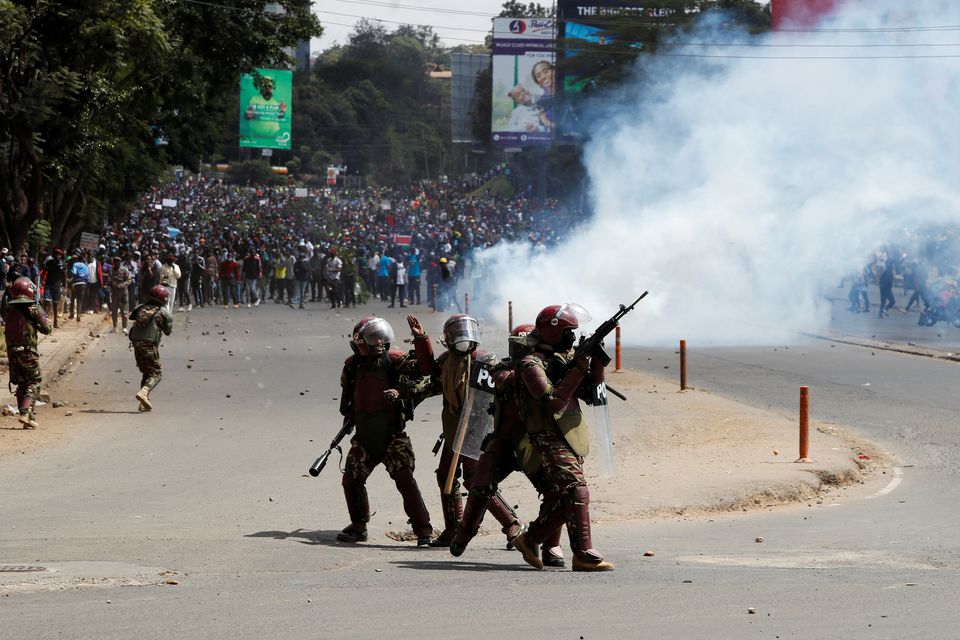
When protesters attempt to storm the Kenyan parliament, police fire, killing many of them
Security was Kenyan President William Ruto’s “utmost priority” on Tuesday, following violent rallies against a tax bill that resulted in at least five people being killed by police shooting at those attempting to assault the assembly.
Protesters overpowered police and drove them out of the parliament premises in chaotic scenes in Nairobi’s capital. Later, Citizen TV showed damage from inside the largely burned-out structure.
There were also fights and protests in a number of other Kenyan cities and towns, with many of the demonstrators demanding that Ruto step down and denouncing the tax increases.
Ruto said the tax debate had been “hijacked by dangerous people” in a nationally televised speech.
He declared, “It is not in order, or even conceivable, that criminals posing as peaceful protestors can reign terror against the people” and promised an immediate reaction to the “treasonous events” of Tuesday.
After the demonstrators in Nairobi were not dispersed by water cannons or tear gas, police opened fire. Local media reported that they eventually succeeded in ejecting demonstrators from the parliament building and that legislators were taken out via an underground passage.
Later on Tuesday, Defense Minister Aden Duale announced that the army had been called in to assist the police in handling a “security emergency” that had led to the “destruction and breaching of critical infrastructure”.
Outside parliament, a Reuters reporter counted the bodies of at least five demonstrators.
According to the Kenya Medical Association, 31 persons had been shot—13 with live bullets and 4 with rubber—and at least five of those victims had died while receiving medical attention.
To safeguard medical personnel and ambulances, the group urged the establishment of secure medical corridors by the authorities.
Caught in the midst of rival demands
Ruto was elected nearly two years ago on a platform of supporting Kenya’s working poor. However, he is now caught between the demands of a hard-pressed populace and lenders like the International Monetary Fund, which wants the government to reduce deficits in order to get additional assistance.
Kenyans have been facing a number of economic setbacks as a result of the COVID-19 pandemic’s aftereffects, the conflict in Ukraine, two years in a row of drought, and currency depreciation.
The goal of the financial law is to raise an extra $2.7 billion in taxes in an attempt to reduce Kenya’s enormous debt load, which accounts for 37% of the country’s yearly income only from interest payments.
The White House in Washington declared that the US was keeping a close eye on the circumstances in Nairobi and recommending composure.
In a joint statement, ambassadors and high commissioners from Germany, the United States, and Britain expressed their grave concern about the violence they had seen during recent anti-tax demonstrations and urged everyone to exercise calm.
According to a CNN interview, former US President Barack Obama’s half-sister, Kenyan activist Auma Obama, was among the demonstrators who were tear-gassed during the riots.
During the police raid, internet monitor Netblocks reported that there were significant disruptions to internet services throughout the nation of East Africa. Leading network provider in Kenya, Safaricom, reported that two of its underwater cables were experiencing disruptions, however it was not immediately apparent what was causing them.
The finance bill was adopted by parliament, advancing it to a third reading by legislators. The measure will then be forwarded to the president for signature. If he objects, he can send it back to parliament.
Politicians from the opposition demanded that Ruto resign.
Senior opposition leader Eugene Wamalwa declared on television, “Ruto must go, Ruto must resign, he must do the honorable thing.”
Raila Odinga, a different opposition leader, called for the budget bill to be immediately withdrawn to allow for discussion.
“I am disturbed at the murders, arrests, detentions and surveillance being perpetrated by police on boys and girls who are only seeking to be heard over taxation policies that are stealing both their present and future,” he stated in a press release.
In exchange for removing plans to impose additional taxes on financial transactions, cooking oil, bread, and car ownership, the administration has made some compromises. Protesters, however, have not found that sufficient.
According to the finance ministry, the concessions would force the government to make spending cuts or raise taxes in other areas, blowing a 200 billion Kenyan shilling ($1.56 billion) hole in the 2024–25 budget.
The protests on Tuesday started off in a festive mood, but as the numbers grew, police used tear gas in Nairobi’s Central Business District and the impoverished Kibera area. Stones were hurled into police lines by protesters as they sought shelter.
In Eldoret, Ruto’s hometown in western Kenya, where large throngs of protesters crowded the streets and many businesses were closed due to fear of violence, police also used tear gas.
More fighting broke out in Mombasa, a coastal city, while protests were organized in Kisumu, on Lake Victoria, and Garissa, in eastern Kenya. In Kismayu, the port of neighboring Somalia, police had blocked the major road leading there.
Crowds in Nairobi sang “Ruto must go” and “All can be possible without Ruto” in Swahili. In the last hours before the disturbance turned violent, demonstrators waved Kenyan flags and shouted whistles while music played over loudspeakers.
Requests for comment from Reuters were not answered by the police.
ECOLOGICAL ACTION
Last week, two days of protests saw thousands of people take to the streets of Nairobi and several other cities as an online movement organized by young people gained traction.
In Kenya, political leaders who have been open to negotiated settlements have often called protests; but, the young Kenyans involved in the present rallies lack an official leader and have been becoming more assertive in their demands.
Initially centered around the finance measure, the protestors’ demands have expanded to include Ruto’s resignation.
Kenya’s sovereign dollar bonds fell on Tuesday afternoon amid the disturbance, according to Tradeweb data. With a trade of 0.6 cents less at 74.7 cents on the dollar, the 2034 maturity saw the biggest decline.
“They are planning for corruption,” 18-year-old demonstrator Hussein Ali stated. “We are not going to back down. The government is the one who will give in. Not us.
All Categories
Recent Posts
Tags
+13162306000
zoneyetu@yahoo.com



